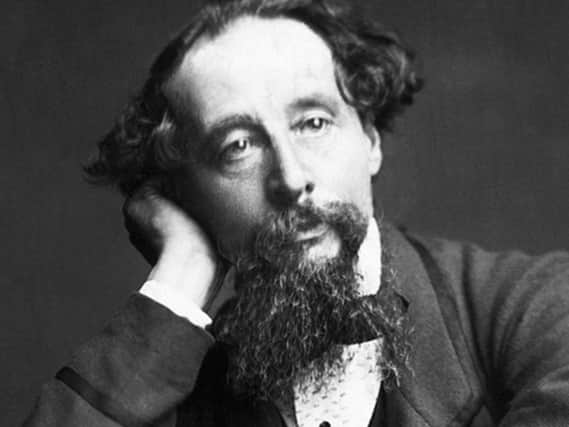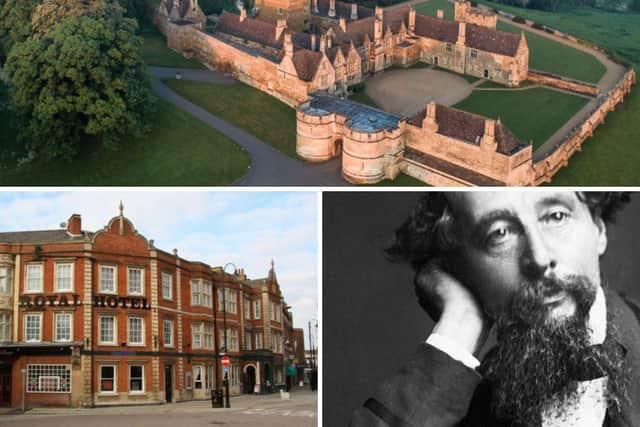How rural Corby and the town of Kettering had an important influence on the work of Charles Dickens


Victorian novelist Charles Dickens is perhaps best known for his gritty representations of working-class Victorian Britain.
But during his life, the renowned writer drew greatly on his experiences in what was then the quiet county of Northamptonshire.
Advertisement
Hide AdAdvertisement
Hide AdAs a young reporter for the Morning Chronicle, Dickens visited Kettering to cover the 1835 by-election, called after the sudden death of Northamptonshire North Whig MP Viscount Milton.


With the chance of a fourth Conservative seat in the county, the controversy over the corn laws and the country on the cusp of political change, the election drew an unusual amount of national press attention.
The candidates were Conservative Thomas Maunsell and Whig William Hanbury. The fight was a dirty one, with both parties claiming certain success and throwing around accusations of voter intimidation and encouraging inebriation among the electorate.
At the nomination, Maunsell and a large entourage arrived on horseback and used horse whips to bully their way to the front of the crowd. Amid fighting and ugly scenes in the town centre, officers of the law confiscated a loaded pistol from one of Maunsell’s supporters after he threatened the crowd with it.
Advertisement
Hide AdAdvertisement
Hide AdCharles Dickens, who was staying in the grand Jacobean White Hart, now the Royal Hotel in the market place, which also hosted Queen Victoria, watched the hustings from the reporters’ pit.
He told his fiancée he had never seen ‘anything more sickening and disgusting’.
He said the Conservatives were ‘a ruthless set of bloody-minded villains … led by clergymen and magistrates.’
Following the speeches, two local Whig and Conservative leaders whipped-up the crowd into a frenzy.
Advertisement
Hide AdAdvertisement
Hide AdDickens was asked to stay in the area by his editor, saying: “We shall have an incessant repetition of the sounds and sights of yesterday ‘till the Election is over – bells ringing, candidates speaking, drums sounding, a band of eight trombone (would you believe it?) blowing – men fighting, swearing, drinking, and squabbling – all riotously excited, and all disgracing themselves.”
On the morning of the poll, he wrote: “the noise and confusion here … is so great that my head is splitting … the voters … are drinking and guzzling and howling and roaring in every house of entertainment there is”.
Journalists were forced to retreat to his room at the White Hart, and they later hired a carriage to take them to Boughton House, where they enjoyed an evening of hospitality before escaping to Northampton.
Maunsell won by a landslide. It is thought that Dickens’ damning account of the Eatanswill election in the Pickwick Papers, written over the next few months, had its roots in the Northamptonshire North election.
Advertisement
Hide AdAdvertisement
Hide AdDickens’s orphanage in Oliver Twist was eventually to be based in a small town 75 miles from London - perhaps not coincidentally the same distance as Kettering is from London.
Despite his terrible earlier time in the county, Dickens late returned to Northamptonshire and had a very different experience.
He had become friendly with Richard and Lavinia Watson, owners of Rockingham Castle.
He stayed at the castle, now in the borough of Corby, several times and performed plays in the panel room.
Advertisement
Hide AdAdvertisement
Hide AdIt is thought that Rockingham provided the inspiration for several novels including Chesney Wold in his novel Bleak House.
In an 1853 letter to Lavinia, Dickens wrote: “In some descriptions of Chesney Wold I have taken many bits, chiefly about trees and shadows, from observations made at Rockingham. I wonder whether you have ever thought so!”
Walter Dexter, an editor of the Pilgrim edition of Dickens’s letters wrote: “All authorities agree that Lady Dedlock’s ‘place in Lincolnshire’ [Chesney Wold] in Bleak House was founded on Rockingham Castle in the neighbouring county.”.
In Bleak House, Rockingham Village is thought to provide some inspiration for the ‘hilly little street’ and The Sondes could be The Dedlock Arms, with its sign ‘swinging over the road in front’.
Advertisement
Hide AdAdvertisement
Hide AdWhile staying at Rockingham, Dickens’ room overlooked the famous Elephant Walk, with its unique hedge, for the Ghost’s Walk in Bleak House.
The great writer also classed Clara Thornhill, of Rushton Hall as a friend and stayed at the country house on several occasions.
It is thought to be the inspiration for the Satis House, the home of Miss Havisham, in Great Expectations.
And it is also thought that his pal Caroline Chisholm, of Northampton, was the model for Mrs Jellyby in Bleak House.
- Extracts from Charles Dickens at Rockingham andThe Victorian Commonsby Martin Spychal